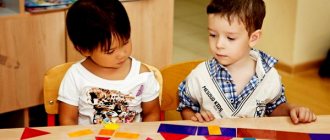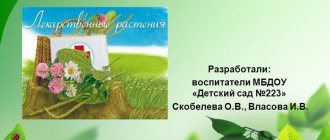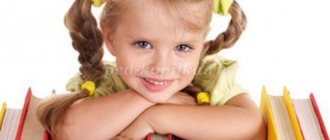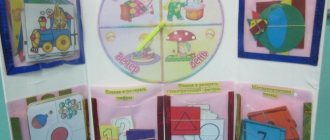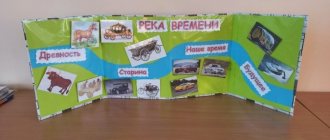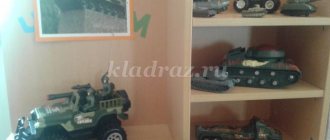Romanova Olga Valerievna
Relevance.
Mathematics is one of the most difficult subjects in the school cycle, therefore, for a child to successfully study at school already in kindergarten, it is necessary to promote the mathematical development of a preschooler and expand his mathematical horizons
, improve the quality of mathematical preparation for school. This will allow children to more confidently navigate the simplest patterns of the reality around them and actively use mathematical knowledge in everyday life.
To teach preschool children to love mathematics, maintain interest in intellectual activity, and encourage them to solve search problems, it is necessary to approach the organization of the learning process creatively and with interest, to use the variety and variability of educational games with mathematical content.
Type of project : educational - gaming.
Implementation period: (2 months - October, November)
Participants: group (teacher, children of the group, parents).
The goal of the project: the formation of elementary mathematical concepts in children of senior preschool age through entertaining material in the organized and independent activities of children.
Tasks:
- To create conditions for preschoolers to master mathematical concepts, to ensure the successful development of children’s abilities and thinking.
- Improve the skills of quantitative and ordinal counting within 10, help consolidate the ability to recognize and name geometric shapes.
- To help improve the ability to identify collections of objects or figures that have a common property.
- Promote the development of mental operations: logical thinking, ingenuity, visual memory, imagination, ability to compare and analyze.
- To promote the development of interest in games that require mental stress and intellectual effort.
- To promote independence, the ability to understand a learning task and carry it out independently.
- To help improve the level of readiness of older preschool children for school.
- Encourage parents to participate in the project and work with their children at home.
Expected results:
- Increasing the level of mathematical concepts in children of senior preschool age.
- Children have developed an interest in the very process of learning mathematics.
- Children independently find ways to solve cognitive problems, strive to achieve their goals, overcome difficulties, and are able to transfer learned experience to new situations.
- Activating parents' interest in the use of mathematical games and exercises.
- Parents' awareness of the importance of forming elementary mathematical concepts in children with the help of entertaining material, expanding parents' knowledge about entertaining material.
Preparatory stage:
- Determining the theme of the project.
- Setting the goals and objectives of the project.
- Selection of methodological and fiction literature on the topic of the project.
- Selection of didactic, outdoor games, dynamic breaks on the topic of the project.
- Making educational games in mathematics.
- Drawing up a plan for the main stage of the project.
- Development of notes for proposed educational activities, quizzes.
- Involving parents in working together on the project:
— creative task: select mathematical riddles, problems, puzzles and colorfully arrange this material;
— assistance from parents in making educational games based on FEMP.
- Conducting a survey of parents.
- Design of the folder - movement "Mathematics for preschoolers".
- Conversation with parents “How to organize children’s games at home using entertaining materials”
Main stage:
- Classes according to calendar-long-term planning in the preparatory group for school:
— Lesson on FEMP “Letters from the Queen of Mathematics”, “City of Mathematics”;
— Visual arts class: drawing “Funny Figures”, sculpting “Funny Figures”.
- Reading mathematical fairy tales, fairy tales with elements of counting: “Three Bears”, “Two Little Bears”, “Twelve Months” by S. Marshak, “Flower - Seven Flowers” by V. Kataev; story by K. Ushinsky “Four Desires”.
- Memorizing poems about numbers, counting rhymes, riddles about geometric shapes and numbers.
- View the computer presentation “Funny Shapes.”
- Coloring math coloring pages, drawing numbers.
- Construction.
- Working with counting sticks.
- Didactic games with mathematical content: “Cubes for everyone”, “Dots”, “Tic-tac-toe”, “Mathematical lotto”, “Labyrinths”, “What numbers are lost”, “Funny numbers”, “Mathematical houses”, “Mosaic of caps", "Columbus Egg" "Tangram", "Mathematical tablet "Pythagorean Puzzles", "Magic Circles", "Dominoes", "Wonderful Bag", Dienesh Blocks, Number Houses, "Playing Mathematics" "Ladybugs and Daisies" , Cuisenaire Sticks, Caye Honeycombs, "Little Designer"
- Guessing riddles, entertaining questions, comic puzzles, puzzles.
- Outdoor games: “Make a figure”, “The sea is agitated”.
- Finger gymnastics.
- Physical education, “Make a figure.”
- Conversation “What interests me about mathematical games.”
Parent survey.
Consultations for parents.
The final stage:
- An exhibition of educational games made together with children and parents.
- Independent activity of children in the math corner.
- Using didactic games for FEMP
- The final event is the “Smart Men and Women” quiz.
- Processing and design of project materials.
Progress of the project.
Work on the project took place in several stages. At the preparatory stage, a plan was drawn up for the implementation of the main stage of the project, methodological and fiction literature, illustrative material, a computer presentation “Funny Figures”, didactic games, physical education lessons, and finger gymnastics were selected. Educational games with mathematical content were produced.
Parents were involved in preparing the implementation of the project: a survey was conducted with them, and a folder was prepared for them - the “Mathematics for Preschoolers” folder. Parents also provided assistance in making educational games in mathematics. Parents took an active part, selecting entertaining mathematical material (problems, riddles, puzzles, puzzles) and colorfully designed it.
At the main stage of the project, many activities were related to the theme of the project. During classes on speech development and reading fiction, we read mathematical stories and fairy tales with mathematical content:
— “Three Bears”, “Two Little Bears”, “Twelve Months” by S. Marshak, “Flower - Seven Flowers” by V. Kataev; story by K. Ushinsky “Four Desires”;
- memorized poems about numbers, counting rhymes, and mathematical riddles.
During art classes, children created drawings using geometric shapes and made “magic” numbers from plasticine.
During mathematics classes and during free activities, children worked with mathematical copybooks - coloring books, and made buildings from construction sets, mosaics, and Dienesh blocks. The children also worked with counting sticks: they assembled figures according to the pattern and design.
We played a lot of homemade didactic games with mathematical content:
- "Tic Tac Toe." Objectives: to promote the development of attention, memory, the ability to focus on a specific subject for a long time, to promote the development of the ability to distinguish between concepts such as “diagonally”, “vertically”, “horizontally”.
- "Mathematical Lotto" Objectives: to promote the assimilation of the order of numbers from 1 to 10; consolidation of knowledge about geometric shapes.
- "Labyrinths". Objectives: to promote the development of logical and spatial thinking, versatility, the ability to achieve goals, to promote the development of perseverance and patience.
- “What numbers are missing?” Goal: developing the ability to determine the place of a particular number in a series and its relationship to the previous and subsequent numbers.
- "Math Houses" Goal: developing knowledge about the composition of a number from two smaller ones.
- Puzzle "Tangram". Goal: to develop children’s ability to analyze images, identify geometric shapes in them, break an entire object into parts, and vice versa - to compose a given model from elements.
- "Math tablet". Goal: formation of the ability to create images, development of imaginative thinking, con. Goal: development of counting skills and consolidation of number composition.
- "Ladybugs" simulator. Goal: developing the ability to navigate on a playing field with cells, move a ladybug in the indicated direction, determine the spatial arrangement of objects: “above”, “below”, “right - left”, “left - right”.
- “Clock” Purpose: to practice determining and setting time using a clock.
- “Mathematical scales” Purpose: to teach children how to add numbers and compare numbers with each other.
- “Math puzzles” Goal: develop the ability to make a whole from parts, improve the skills of quantitative and ordinal counting within 10.
- “Strawberries in jam” Goal: to develop the ability to count, graphic and alphabetic writing of numbers, the concept of quantitative composition.
- “Do the math” Purpose: to practice solving examples of addition and subtraction.
- “The fourth odd one” Goal: to develop the ability to classify and group shapes by color, shape and size.
- “Decide correctly” Goal: to consolidate mental counting skills within 10 and the ability to denote a number with a number.
- “What first, what then” Goal: to improve ideas about time periods.
- “Composition of a number” Purpose: to practice decomposing a number into two smaller ones and composing a number from two smaller ones.
- “Hide and Seek” Purpose: to consolidate ideas about geometric shapes, their properties, the ability to recognize shapes regardless of their spatial position.
- “Add a figure” Goal: to consolidate the ability to classify and group figures by color, shape, and find a pattern.
- "Funny numbers." Goal: developing the ability to lay out numbers from various available materials, developing fine motor skills.
We solved comic problems, puzzles, and guessed mathematical riddles. In this work we used baby books made by parents. Together with the children, we learned and mastered new outdoor games, dynamic pauses and finger gymnastics with mathematical content.
At the final stage of the project, the following were created: an entertaining mathematics corner, an exhibition of joint creative works of parents and children. A math quiz called “Smart Men and Women” was also held.
Project results.
Work on the project had a positive effect on increasing the level of children’s mathematical concepts, also developed an interest in the process of learning mathematics and the intellectual activity of children, enriched the teaching skills for the formation of elementary mathematical concepts, and increased parents’ interest in participating in the project.
Literature:
1. Kozina L. Yu. “Mathematics games for preschoolers” - M.: Sfera, 2008.
2. Mikhailova Z. A. “Game tasks for preschoolers” - St. Petersburg: Aksident, 1996.
3. Danilova V.V., Richterman T.D. and others. “Teaching mathematics in kindergarten” - M.: Academy, 1997.
4.Serbina E.V. “Mathematics for Kids” - M.: Education, 1992.
5. Sharyigina T.A. "Accurate tales. Formation of temporary representations" M.: Knigolyub, 2005.
6. Krasheninnikov E.E. , Kholodova O.L. “Development of cognitive abilities of preschoolers (5-7 years old).
